| Reviews & Columns |
|
Reviews DVD TV on DVD Blu-ray 4K UHD International DVDs In Theaters Reviews by Studio Video Games Features Collector Series DVDs Easter Egg Database Interviews DVD Talk Radio Feature Articles Columns Anime Talk DVD Savant Horror DVDs The M.O.D. Squad Art House HD Talk Silent DVD
|
DVD Talk Forum |
|
|
| Resources |
|
DVD Price Search Customer Service #'s RCE Info Links |
|
Columns
|
|
|
Paradise Lost: The Child Murders at Robin Hood Hills
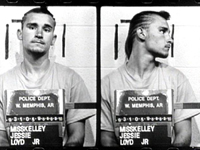
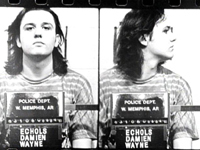
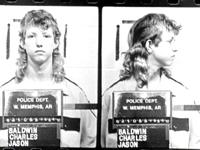
I have yet to have children of my own and, therefore, cannot even imagine what it must have felt like for the parents of Steve Branch, Michael Moore, and Christopher Byers to first hear of the brutal, unimaginable crimes that were perpetrated upon their children. I've lost many people in my family, but the pain that one must feel for the loss of a parent or child is something that I cannot even begin to fathom. That being said, West Memphis, Arkansas not only experienced an absolutely heinous crime with the triple murder of those three 8-year-old boys, but that very crime also spurred one of the most controversial, intriguing, and widely-talked-about trials since the Salem Witch Trials of 1692. The impetus for all this controversy and public attention? The arrest of three local teenagers with a penchant for wearing black and listening to heavy metal music, and the accusation that Jesse Misskelley, Damien Echols, and Jason Baldwin killed the three 8-year-olds as part of a Satanic ritual. All this with little or no evidence actually linking the teenagers to the crime.
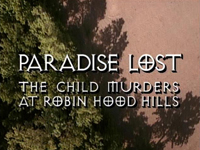 Enter filmmakers Joe Berlinger and Bruce Sinofsky. Given an unbelievable amount of access to the participants, crime scene evidence, and all other areas of the case, Berlinger and Sinofsky craft one of the most critically revered documentaries in recent cinematic history. Paradise Lost: The Child Murders at Robin Hood Hills pulls absolutely no punches throughout its two-and-a-half-hour runtime, and takes the viewer through just about every aspect of the macabre tale of the West Memphis Three. From the very first moments of the film, we see just how far the filmmakers are willing (and allowed) to go as they show the nude bodies of the three victims exactly as they were found at the crime scene. Right from the start we see that Berlinger and Sinofsky mean business, and that this is not a film for the faint of heart. Even for someone without children of his or her own, the grisly details of the case are often difficult to watch.
Enter filmmakers Joe Berlinger and Bruce Sinofsky. Given an unbelievable amount of access to the participants, crime scene evidence, and all other areas of the case, Berlinger and Sinofsky craft one of the most critically revered documentaries in recent cinematic history. Paradise Lost: The Child Murders at Robin Hood Hills pulls absolutely no punches throughout its two-and-a-half-hour runtime, and takes the viewer through just about every aspect of the macabre tale of the West Memphis Three. From the very first moments of the film, we see just how far the filmmakers are willing (and allowed) to go as they show the nude bodies of the three victims exactly as they were found at the crime scene. Right from the start we see that Berlinger and Sinofsky mean business, and that this is not a film for the faint of heart. Even for someone without children of his or her own, the grisly details of the case are often difficult to watch.
Nominated for the Grand Jury Prize at the Sundance Film Festival, Paradise Lost went on to win a Peabody Award, the National Board of Review's prize for Best Documentary, and an Emmy®. Not to mention the fact that the film has amassed an enormous cult following in the years since its release. My guess is that Paradise Lost has won all these accolades and recognition not just because it's a great film (it is a great film), but also because it is an incredibly important film.
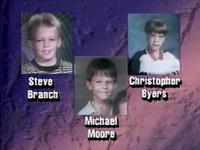 Rather than create your typical by-the-numbers crime documentary, Berlinger and Sinofsky craft a film that presents a West Memphis public hungry to put three young outsiders behind bars for a crime they may, or may not, have committed. They give Misskelley, Echols, and Baldwin a soul by allowing them to speak for themselves. They give the three teenagers a heart by giving them the time to develop in front of the camera. And, perhaps most importantly, they give the accused youngsters a glimmer of hope by allowing them to tell their side of the story. Instead of painting Misskelley, Echols, and Baldwin as three ragtag kids that wear all black while listening to Metallica, practicing Wicca, and performing Satanic rituals in their parents' backyards, the filmmakers show the teenagers as people who – although, yes, they liked to wear all black, listen to Metallica, and had an interest in the Wicca religion – had girlfriends, had gone to church, and were very possibly easily coerced into offering up a quick confession. Berlinger and Sinofsky do what the residents of West Memphis had failed to convey to the public; they showed the teenagers as human beings rather than the monsters that most people made them out to be.
Rather than create your typical by-the-numbers crime documentary, Berlinger and Sinofsky craft a film that presents a West Memphis public hungry to put three young outsiders behind bars for a crime they may, or may not, have committed. They give Misskelley, Echols, and Baldwin a soul by allowing them to speak for themselves. They give the three teenagers a heart by giving them the time to develop in front of the camera. And, perhaps most importantly, they give the accused youngsters a glimmer of hope by allowing them to tell their side of the story. Instead of painting Misskelley, Echols, and Baldwin as three ragtag kids that wear all black while listening to Metallica, practicing Wicca, and performing Satanic rituals in their parents' backyards, the filmmakers show the teenagers as people who – although, yes, they liked to wear all black, listen to Metallica, and had an interest in the Wicca religion – had girlfriends, had gone to church, and were very possibly easily coerced into offering up a quick confession. Berlinger and Sinofsky do what the residents of West Memphis had failed to convey to the public; they showed the teenagers as human beings rather than the monsters that most people made them out to be.
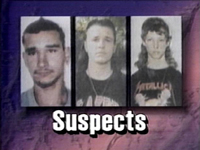 Now, I don't want you to get the wrong impression by what I'm saying here. I absolutely do not know if Jesse Misskelley, Damien Echols, and Jason Baldwin murdered and mutilated those three 8-year-old boys. I do not profess to know that the accused teenagers are, beyond a shadow of a doubt, not guilty of the heinous crimes for which they've been incarcerated. That's not really my point here anyway. My point is that what put those three teenagers behind bars (and, for Damien Echols, on Death Row) was not good hard evidence, quality prosecution, or great police work. What put Misskelley, Echols, and Baldwin behind bars was something far more horrible than any simple miscarriage of justice. What made them into the Monsters of West Memphis and what put them in jail for the rest of their lives was simple, unadulterated intolerance. After the despicable triple murder in West Memphis, the police and the people of the small Arkansas town needed someone to be held accountable for the crime. The easiest target: three outsider teenagers that are "different" than everyone else. It's been said many times that people often fear what they don't understand, and this very fact is what landed the West Memphis Three in jail. Their black clothes, love of heavy metal music (especially Metallica), interest in alternative religions, and disinterest in the "normal" teenage activities made Misskelley, Echols, and Baldwin an easy target for a bloodthirsty group of intolerant people.
Now, I don't want you to get the wrong impression by what I'm saying here. I absolutely do not know if Jesse Misskelley, Damien Echols, and Jason Baldwin murdered and mutilated those three 8-year-old boys. I do not profess to know that the accused teenagers are, beyond a shadow of a doubt, not guilty of the heinous crimes for which they've been incarcerated. That's not really my point here anyway. My point is that what put those three teenagers behind bars (and, for Damien Echols, on Death Row) was not good hard evidence, quality prosecution, or great police work. What put Misskelley, Echols, and Baldwin behind bars was something far more horrible than any simple miscarriage of justice. What made them into the Monsters of West Memphis and what put them in jail for the rest of their lives was simple, unadulterated intolerance. After the despicable triple murder in West Memphis, the police and the people of the small Arkansas town needed someone to be held accountable for the crime. The easiest target: three outsider teenagers that are "different" than everyone else. It's been said many times that people often fear what they don't understand, and this very fact is what landed the West Memphis Three in jail. Their black clothes, love of heavy metal music (especially Metallica), interest in alternative religions, and disinterest in the "normal" teenage activities made Misskelley, Echols, and Baldwin an easy target for a bloodthirsty group of intolerant people.
Joe Berlinger and Bruce Sinofsky use Paradise Lost as a way to combat this intolerance, at least as best they can, by showing the public the entire picture. And when one sits back and takes it all in, the injustice served to these three teenagers is astounding. The lack of evidence. The rush to judgment. The preconceived notions of what "normal" really is for a teenage boy. It's all there in plain sight when you really look for it. Since the film's release, the West Memphis Three have garnered support from all types of people including celebrities such as Henry Rollins, Jack Black, Margaret Cho, and Stephen King, and there have been numerous fundraising concerts, books, and CDs produced. Once Paradise Lost exposed the injustice, the public support started filtering in and continues to thrive to this day.
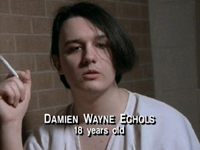 The fact still remains, however, that no one knows the real truth but the perpetrators of these horrible murders. I hope the evidence needed to convict someone does come out, and I hope the killer (or killers) of the young boys is brought to swift justice. Jesse Misskelley, Damien Echols, and Jason Baldwin may very well have murdered Steve Branch, Michael Moore, and Christopher Byers, but as of right now, there's no solid evidence to prove that's the case. Everyone deserves a fair shake and a fair trial. These three teenagers had no such thing and were likely put behind bars for the rest of their lives because of their preference in clothing, music, and religion. That is injustice if I've ever seen it.
The fact still remains, however, that no one knows the real truth but the perpetrators of these horrible murders. I hope the evidence needed to convict someone does come out, and I hope the killer (or killers) of the young boys is brought to swift justice. Jesse Misskelley, Damien Echols, and Jason Baldwin may very well have murdered Steve Branch, Michael Moore, and Christopher Byers, but as of right now, there's no solid evidence to prove that's the case. Everyone deserves a fair shake and a fair trial. These three teenagers had no such thing and were likely put behind bars for the rest of their lives because of their preference in clothing, music, and religion. That is injustice if I've ever seen it.
The DVD
Video:
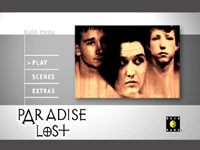 Paradise Lost: The Child Murders at Robin Hood Hills is presented in its original 1.33:1 full frame format and, despite being a low-budget film shot mostly on 16mm, this transfer holds up very well. There are a few problems, such as excessive grain in spots, lack of detail at times, and some older faded courtroom video footage, but most of the film looks much better than it ever has before. Flesh tones appear accurate and black level is quite good. Colors and detail, in some of the grislier footage, are sometimes appear a bit faded, but it merely adds to the film's ambience. This is, overall, a very good visual presentation, but there is one glaring issue. The layer change is a bit of a mess.
Paradise Lost: The Child Murders at Robin Hood Hills is presented in its original 1.33:1 full frame format and, despite being a low-budget film shot mostly on 16mm, this transfer holds up very well. There are a few problems, such as excessive grain in spots, lack of detail at times, and some older faded courtroom video footage, but most of the film looks much better than it ever has before. Flesh tones appear accurate and black level is quite good. Colors and detail, in some of the grislier footage, are sometimes appear a bit faded, but it merely adds to the film's ambience. This is, overall, a very good visual presentation, but there is one glaring issue. The layer change is a bit of a mess.
Around the 1:30:00 mark in the film, the layer change occurs and causes a noticeable pause. The real problem, however, is that the film then immediately repeats about one minute's worth of footage. At first, I thought it might have just backtracked to a previous chapter or a minute earlier in the film, but after testing the disc on three separate players it became clear that this is an error with the disc. The time continues to run during this repeated minute (making the film a minute longer than it should be), and it appears that when the film picks up on the second layer of the disc, that repeated minute must have been copied not only onto the end of the first layer, but also the beginning of the second layer. This isn't a huge problem – it's certainly better than missing a minute's worth of footage – but it is a slight annoyance that the quality control department at New Video and DocuRama should have easily caught.
Sound:
The audio on this disc is presented in a Dolby 2.0 stereo format that actually handles the film's soundtrack very well. Dialogue – clearly the most important part of this documentary – comes through clear, crisp, and distinct. Each aspect of the track is nicely balanced with the soundtrack never overwhelming the dialogue or the few sound effects throughout the film. The film's music – provided by the band Metallica – sounds excellent throughout, although could have certainly benefited from a bit more low-end. Pumped through Dolby Pro Logic II decoding, Metallica's music sounded even more ambient and enveloping. Though I'm not sure it's even necessary, it would have been great to hear what a Dolby Digital 5.1 track would have sounded like for the film. This track, nonetheless, does a fine job of providing a quality aural experience.
Extras:
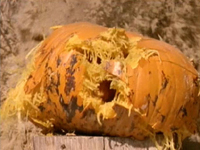 The most substantial, and interesting, extra feature on this disc is the Damien Echols Trial Testimony that runs about forty-five minutes long and includes much more testimony footage than what actually appears in the film itself. This courtroom footage was originally shot on videotape and the feature wisely includes a warning that states: "Due to deterioration of the original videotapes, the picture and sound quality are not optimal." While there are some issues with the audio-visual presentation of the feature, it's not nearly as bad as the warning suggests. There are a few video blips here and there, but they never really distract from what is definitely a welcome addition to the DVD. Nevertheless, this is wonderful footage to finally be able to watch, and it's great to see Echols's testimony in its fuller form without all of the editing.
The most substantial, and interesting, extra feature on this disc is the Damien Echols Trial Testimony that runs about forty-five minutes long and includes much more testimony footage than what actually appears in the film itself. This courtroom footage was originally shot on videotape and the feature wisely includes a warning that states: "Due to deterioration of the original videotapes, the picture and sound quality are not optimal." While there are some issues with the audio-visual presentation of the feature, it's not nearly as bad as the warning suggests. There are a few video blips here and there, but they never really distract from what is definitely a welcome addition to the DVD. Nevertheless, this is wonderful footage to finally be able to watch, and it's great to see Echols's testimony in its fuller form without all of the editing.
We also have a brief chronology of events text feature that provides the broad strokes of the course of events discussed in the film, the theatrical trailer for Paradise Lost: The Child Murders at Robin Hood Hills, and a downloadable PDF file of the extended timeline and case updates. Although they are also available for free download at www.wm3.org, it would have been great to have the extended timeline and case updates available as a set-top text feature as well, for those who would rather explore all the features on their set-top players.
Also included on this disc are text biographies of Joe Berlinger and Bruce Sinofsky, a brief text feature on DocuRama, and the entire text of the DocuRama catalog. A few trailers for other DocuRama features are also included.
Final Thoughts:
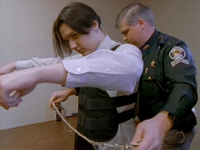 A groundbreaking documentary in many ways, Paradise Lost: The Child Murders at Robin Hood Hills exposes the absolute injustice dealt upon Jesse Misskelley, Damien Echols, and Jason Baldwin as they were accused, arrested, and incarcerated for a triple murder which there is no solid evidence to prove they committed. The three teenagers, rather, were jailed because of the way they looked, the music they listened to, and the alternative religions they chose to study. Joe Berlinger and Bruce Sinofsky do a superb job of crafting a film that not only works as a straight crime documentary, but also functions as an expose on the intolerance of people and the shortcomings of a justice system that clearly does not always work. Misskelley and Baldwin will never step foot outside of prison for the rest of their lives and Damien Echols awaits his turn on Death Row. All this without any hard evidence linking them to the crime. If the evidence eventually surfaces that can prove their involvement, then they deserve their place behind bars. For now, however, listening to Metallica is not (and never has been) a crime worthy of incarceration. In fact, it's not a crime at all, last time I checked. One of the most searing and tension-filled documentaries you're ever likely to see, Paradise Lost exposes the truth about three teenagers who may or may not have simply gotten a really bad rap.
A groundbreaking documentary in many ways, Paradise Lost: The Child Murders at Robin Hood Hills exposes the absolute injustice dealt upon Jesse Misskelley, Damien Echols, and Jason Baldwin as they were accused, arrested, and incarcerated for a triple murder which there is no solid evidence to prove they committed. The three teenagers, rather, were jailed because of the way they looked, the music they listened to, and the alternative religions they chose to study. Joe Berlinger and Bruce Sinofsky do a superb job of crafting a film that not only works as a straight crime documentary, but also functions as an expose on the intolerance of people and the shortcomings of a justice system that clearly does not always work. Misskelley and Baldwin will never step foot outside of prison for the rest of their lives and Damien Echols awaits his turn on Death Row. All this without any hard evidence linking them to the crime. If the evidence eventually surfaces that can prove their involvement, then they deserve their place behind bars. For now, however, listening to Metallica is not (and never has been) a crime worthy of incarceration. In fact, it's not a crime at all, last time I checked. One of the most searing and tension-filled documentaries you're ever likely to see, Paradise Lost exposes the truth about three teenagers who may or may not have simply gotten a really bad rap.
Despite some slight problems with the audio-visual presentation on this disc, the inclusion of nearly an hour's worth of extra trial testimony makes this disc one well worth owning. New Video and DocuRama could have really upped the ante with a commentary track from Berlinger and Sinofsky or even a preview of Paradise Lost 2: Revelations (for those who haven't already seen it), but the incredible power of the film alone is easily enough to make this disc highly recommended.
|
| Popular Reviews |
| Sponsored Links |
|
|
| Sponsored Links |
|
|
| Release List | Reviews | Shop | Newsletter | Forum | DVD Giveaways | Blu-Ray | Advertise |
|
Copyright 2024 DVDTalk.com All Rights Reserved. Legal Info, Privacy Policy, Terms of Use,
Manage Preferences,
Your Privacy Choices | |||||||














